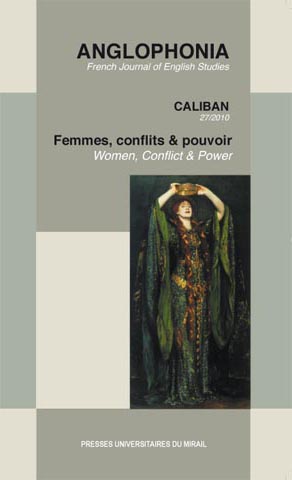Ce numéro d’Anglophonia/Caliban propose une réflexion sur le rapport des femmes au pouvoir et aux conflits dans le monde anglophone, depuis les femmes pétitionnaires dans l’Angleterre du XVIe siècle jusqu’aux femmes impliquées dans le Mouvement des droits civiques aux Etats-Unis et à la Secrétaire d’Etat américaine Hillary Clinton. Il confronte ces trois concepts de féminité, de conflit et de pouvoir selon trois axes qui se croisent et qui structurent l’ensemble du volume : une réflexion sur la prise de pouvoir (ou la tentative de prise de pouvoir) à travers la prise de parole, une réflexion sur les femmes de pouvoir, parfois au pouvoir, et enfin une réflexion sur la représentation ou l’autoreprésentation du conflit et du pouvoir au féminin. Ce volume met ainsi en évidence des continuités et des ruptures dans le rapport particulier des femmes au pouvoir, à l’autorité et au conflit dans l’espace culturel anglophone.
This issue of Anglophonia/Caliban examines the relationship between women, power and conflict in the English-speaking world, from the cases of sixteenth century petition writers in England to the recent case of Hillary Clinton, Secretary of State, via the consideration of women who took part in the twentieth century American Civil Rights movement. The inter-relationships between the concepts of conflict, power and femininity are analysed in the areas of empowerment via speech and language, women’s struggle for and access to political representation and power and, finally, modes of representation and auto-representation applied to or adopted by women. Some articles in the selection throw light on the ways in which women’s relationship to power, authority and conflict within the English-speaking world has remained from some points of view consistent over time, whilst in others there is evidence of a certain disruption of stereotypes, the emergence of forms of resistance and renewal.





